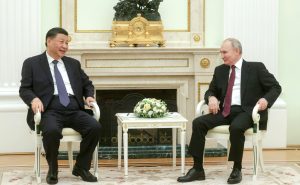Over the last decade, deepening digital cooperation between Russia and China has indicated convergence in their propaganda and disinformation campaigns. As the international community continues to be reshaped by the full-scale invasion of Ukraine and shifts in international diplomacy, these efforts have taken on a new target: the Western financial system.
While there has always been conversation about the ideal governmental and financial system emerging from state-backed media, the collapse of Silicon Valley Bank (SVB) on March 10, 2023, clearly inspired additional efforts from Russia and China to promote a new global financial system and what it could look like.
Russian Telegram channels amplified stories about the Swedish government losing part of its pension fund and claimed the bank was “Russophobic” because it closed Russian accounts. Chinese narratives on Weibo claimed that the Federal Deposit Insurance Corporation (FDIC) had seized deposits from the SVB’s Cayman Islands branch to protect American consumers and target “Asian” stakeholders. Chinese state media also highlighted the failures of the Federal Reserve Board in regulating banks like SVB and the impact it would have on the global economy.
After Credit Suisse had to be bailed out by the Swiss government on March 19, these channels and outlets struck a similar chord. Russian channels claimed the bank had failed because of U.S. sanctions on Russia. Influential voices in Russian propaganda and disinformation contended that the intervention had to happen because so many Chinese and Arab investors pulled their money out due to fear of an already faltering system breaking down completely. Chinese narratives on Weibo claimed that wealthy Americans and Europeans transferred their accounts to Hong Kong after Western banks collapsed.
One of the main arguments made by both Russian and Chinese propaganda and disinformation outlets is that an alternative banking system must be created to bypass Western corruption and inefficiency. This proposed move to a “BRICS-centric” system has found favor among developing countries. When Brazilian President Lula da Silva visited China in April 2023, he called on BRICS countries to move away from the dollar. After his visit, Brazil and Argentina began trading with China using the yuan rather than the dollar. At the same time, Bangladesh started to pay the Russian company Rosatom in yuan for a nuclear power plant that Russia is constructing in Rooppur. When Malaysian President Anwar Ibrahim visited China in April 2023, he floated the idea of an Asian Monetary Fund to avoid using the dollar. Numerous developing countries affected by secondary sanctions on trade have turned to the yuan as an alternative.
An important aspect of the current discourse on de-dollarization is the Western sanctions on Russia after the Ukraine war. In April 2023, the Global Times claimed that 70 percent of Sino-Russian trade transactions used the yuan and the ruble. Chinese narratives have stressed the need to move away from the “hegemony” of the dollar, as it is subject to the whims of U.S. foreign policy. Russian media used the failure of Credit Suisse to claim that Western sanctions had actually backfired. Similarly, early in the invasion, when Russian banks were banned from SWIFT, these same channels advocated for creating a better system that could be used among the BRICS countries. These events show how Chinese and Russian narratives online reflect their foreign policy objectives offline.
As social media platforms strive for more robust content moderation policies and Western governments attempt to curb the influence of nations like Russia and China, the economy will likely become a prominent focus of these campaigns. Governments and private sector leaders alike will need to establish policies and procedures for combatting the rising focus of propaganda and disinformation on such a critical institution, particularly as significant shifts in public sentiment caused by these types of campaigns can cause immediate damage to share price, confidence, and overall health of the market.

































